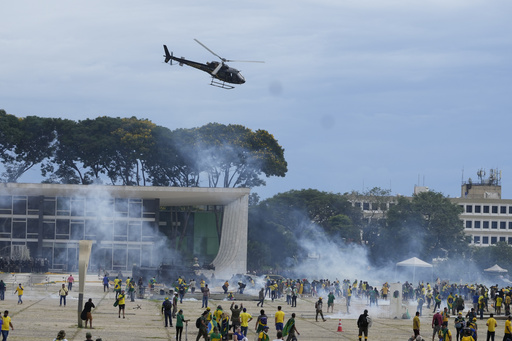Rio de Janeiro — On Wednesday, former Brazilian president Jair Bolsonaro rejected the accusations against him as unclear and dismissed claims that he had plotted a coup to cling to power after losing the 2022 election. He claimed these allegations stem from an authoritarian regime attempting to create internal adversaries.
The charges, presented by Prosecutor-General Paulo Gonet, allege that Bolsonaro engaged in a sophisticated plan to retain power despite his defeat by the current president, Luiz Inácio Lula da Silva. Among the allegations is a purported intention to poison Lula and assassinate Supreme Court Justice Alexandre de Moraes, who has been a critic of Bolsonaro.
In response to these developments, Lula stated that they are currently at the preliminary stage of indictments and affirmed that Bolsonaro, along with the 33 others accused of conspiracy, has the right to defend themselves in court.
Bolsonaro utilized social media platforms X and Instagram to convey his thoughts, asserting that the tactic of accusing political opponents of coup attempts is not unprecedented. He observed that every authoritarian government has historically sought to create internal enemies as a justification for oppression, censorship, and arbitrary detentions.
He drew parallels between his situation and the plights of opposition figures in nations like Venezuela, Cuba, and Nicaragua, all governed by leftist administrations. Bolsonaro noted, “The strategy is well-known: vague allegations are fabricated, concerns for democracy or sovereignty are raised, and opponents are persecuted, dissent is silenced, and power is consolidated.”
The charges against Bolsonaro are founded on an investigation conducted by the Federal Police, which concluded in November. The comprehensive report, spanning 884 pages, details a multifaceted plan supported by evidence aimed at keeping Bolsonaro in power. This scheme allegedly involved fostering public distrust in the electoral process, creating a semblance of legality for the plan through a decree, pressuring military leaders to support his efforts, and instigating unrest in the capital city.
The failure of the coup attempt can largely be attributed to the unwillingness of high-ranking military officials to support it, according to police. The Ministry of Defense in Brazil highlighted the importance of the prosecutor’s report in clarifying the difference between individual actions and those of the military as a whole, with Minister José Mucio Monteiro viewing the charges as a significant step toward accountability.
According to law professor Antônio José Teixeira Martins from Rio de Janeiro State University, Bolsonaro’s response to the charges is part of a broader political strategy aimed at undermining the legitimacy of the investigation by framing it as a targeted persecution. He added, “However, the indictment is firmly based on factual evidence and comprehensive legal arguments.”
Responding to inquiries from the press about the charges, Lula reiterated the principle of presumption of innocence for all individuals. He stated that if the accused can demonstrate that they did not attempt a coup or assassinate the president, vice president, and head of the Supreme Electoral Court, they would be exonerated. Conversely, he warned that if judges conclude they are guilty during their trial, they will face consequences for their actions.




